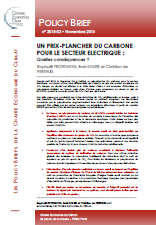
The reform of energy taxation: an extension of carbon pricing in France
by Jérémy El Beze
Abstract:
Introduced by the 2014 Finance Act, the reform of the energy products taxation came into force on 1 January 2014. Little publicized, the measure nevertheless endowed the country with a CO2 taxation system, through the introduction of a carbon component in the existing energy excise tax. Complementing the price signal of the EU Emissions Trading Scheme, this new instrument will allow to extend carbon pricing on emissions from the diffuse sectors and thus to strengthen the French policy for CO2 emissions reduction.
- The reform of energy taxation introduces a carbon component in the calculation of the domestic consumption taxes (DCT). Set at 7€/tCO2 in 2014, this new tool will have little impact on prices during this transition year, this tax increase being offset by a symmetrical reduction of the classical DCT for most of the energy sources.
- The system gears up the following years, with two successive increases of 7.50€/tCO2. The carbon component will reach 22€/tCO2 in 2016, and will cover all types of fossil fuels. This differentiated increase of energy products taxes will represent between 3% and 10% of the current prices of the energy sources.
- By 2016, the ramp-up of the DCT carbon component is expected to generate €4 billion in revenues. Three quarters of those revenues will contribute to funding the reduction in corporate income taxes (called CICE, Crédit d’impôt pour la compétitivité et l’emploi, in French), through the financing of a large tax credit for competitiveness.
- The system of carbon taxation should lead to lower CO2 emissions, between 1 and 5 MtCO2 in 2015 and from 2 to 9 MtCO2 in 2016, in particular due to reductions in diesel, natural gas and domestic fuel oil consumptions.
